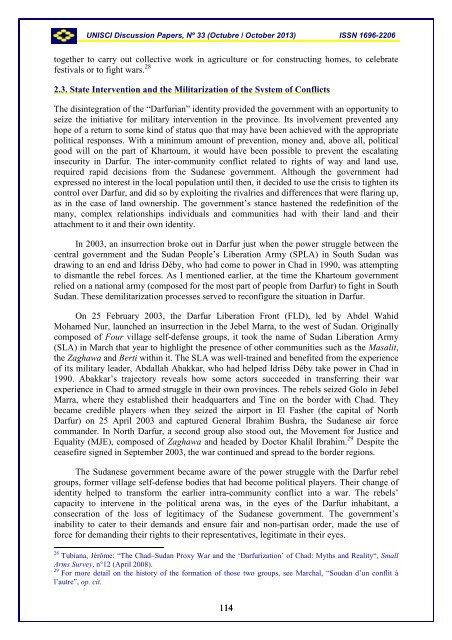UNISCI - Universidad Complutense de Madrid
UNISCI - Universidad Complutense de Madrid
UNISCI - Universidad Complutense de Madrid
You also want an ePaper? Increase the reach of your titles
YUMPU automatically turns print PDFs into web optimized ePapers that Google loves.
<strong>UNISCI</strong> Discussion Papers, Nº 33 (Octubre / October 2013) ISSN 1696-2206together to carry out collective work in agriculture or for constructing homes, to celebratefestivals or to fight wars. 282.3. State Intervention and the Militarization of the System of ConflictsThe disintegration of the “Darfurian” i<strong>de</strong>ntity provi<strong>de</strong>d the government with an opportunity toseize the initiative for military intervention in the province. Its involvement prevented anyhope of a return to some kind of status quo that may have been achieved with the appropriatepolitical responses. With a minimum amount of prevention, money and, above all, politicalgood will on the part of Khartoum, it would have been possible to prevent the escalatinginsecurity in Darfur. The inter-community conflict related to rights of way and land use,required rapid <strong>de</strong>cisions from the Sudanese government. Although the government ha<strong>de</strong>xpressed no interest in the local population until then, it <strong>de</strong>ci<strong>de</strong>d to use the crisis to tighten itscontrol over Darfur, and did so by exploiting the rivalries and differences that were flaring up,as in the case of land ownership. The government’s stance hastened the re<strong>de</strong>finition of themany, complex relationships individuals and communities had with their land and theirattachment to it and their own i<strong>de</strong>ntity.In 2003, an insurrection broke out in Darfur just when the power struggle between thecentral government and the Sudan People’s Liberation Army (SPLA) in South Sudan wasdrawing to an end and Idriss Déby, who had come to power in Chad in 1990, was attemptingto dismantle the rebel forces. As I mentioned earlier, at the time the Khartoum governmentrelied on a national army (composed for the most part of people from Darfur) to fight in SouthSudan. These <strong>de</strong>militarization processes served to reconfigure the situation in Darfur.On 25 February 2003, the Darfur Liberation Front (FLD), led by Ab<strong>de</strong>l WahidMohamed Nur, launched an insurrection in the Jebel Marra, to the west of Sudan. Originallycomposed of Four village self-<strong>de</strong>fense groups, it took the name of Sudan Liberation Army(SLA) in March that year to highlight the presence of other communities such as the Masalit,the Zaghawa and Berti within it. The SLA was well-trained and benefited from the experienceof its military lea<strong>de</strong>r, Abdallah Abakkar, who had helped Idriss Déby take power in Chad in1990. Abakkar’s trajectory reveals how some actors succee<strong>de</strong>d in transferring their warexperience in Chad to armed struggle in their own provinces. The rebels seized Golo in JebelMarra, where they established their headquarters and Tine on the bor<strong>de</strong>r with Chad. Theybecame credible players when they seized the airport in El Fasher (the capital of NorthDarfur) on 25 April 2003 and captured General Ibrahim Bushra, the Sudanese air forcecomman<strong>de</strong>r. In North Darfur, a second group also stood out, the Movement for Justice andEquality (MJE), composed of Zaghawa and hea<strong>de</strong>d by Doctor Khalil Ibrahim. 29 Despite theceasefire signed in September 2003, the war continued and spread to the bor<strong>de</strong>r regions.The Sudanese government became aware of the power struggle with the Darfur rebelgroups, former village self-<strong>de</strong>fense bodies that had become political players. Their change ofi<strong>de</strong>ntity helped to transform the earlier intra-community conflict into a war. The rebels’capacity to intervene in the political arena was, in the eyes of the Darfur inhabitant, aconsecration of the loss of legitimacy of the Sudanese government. The government’sinability to cater to their <strong>de</strong>mands and ensure fair and non-partisan or<strong>de</strong>r, ma<strong>de</strong> the use offorce for <strong>de</strong>manding their rights to their representatives, legitimate in their eyes.28 Tubiana, Jérôme: “The Chad–Sudan Proxy War and the ‘Darfurization’ of Chad: Myths and Reality“, SmallArms Survey, n°12 (April 2008).29For more <strong>de</strong>tail on the history of the formation of those two groups, see Marchal, “Soudan d’un conflit àl’autre”, op. cit.114
















